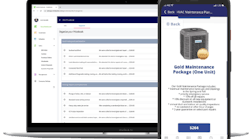I've been thinking about coaching recently. Not the kind that means teaching your kid to cut down on the angle when attacking the ball in soccer, but how to use a coach to improve your business performance.
I spoke to my friend Valerie Schlitt recently and, without any prompting, she raved about her coach, Manny Nowak (www.mannynowak.com). Valerie earned her MBA from the prestigious Wharton School of Business and worked for KPMG International, one of the top consulting firms in the country. In 2001, she went from the major leagues of consulting to the solo and sobering experience of running her own business. So when Valerie raves, Tom tends to listen.
Valerie has all the attributes that one would bet on: She's very smart and personable, has a deep business experience and a powerful work ethic. Her business, VSA Inc. (www.vsaprospecting.com), also makes sense. It specializes in generating leads for companies that will, hopefully, follow-up, close some deals and improve revenues. What could a coach give Valerie when she already had so much talent and smarts?
It had to do with pain. She wanted someone who would ease the burden of stalled revenue after starting a business. Her biggest surprise at going it alone (she now has 11 people who work for her part-time) was the work flow. At big-bucks KPMG, they would give her a task, reward her with praise and a very comfortable salary, and then assign another project. As the owner of VSA, there was no automatic “here's the next assignment.” You have to constantly forage for new business.
So how did Manny help her? After determining that she wore 12 hats, he reduced her duties to four, and passed the remainder to others. According to Valerie, he was valuable in helping her price her projects more competitively. And he helped her overcome the psychological stumbling block of probably not recognizing the real value she offered to clients.
Today, Valerie feels she wasted the first several years because having a coach sooner would have moved her further ahead, earlier. But she's quite pleased with her coach and, more importantly, the new direction of the business.
After talking to Valerie, I called my buddy, Adams Hudson. You might know him as America's Top Contractor Marketer (www.hudsonink.com). Well, if there's someone better at HVACR marketing, let me know. I've never heard of one. Adams is a top trainer and seminar leader, too, but I wondered, does someone as good as him have a coach? What does he say about coaching, now that he offers it through his company as a way for HVACR contractors (and some wholesalers) to improve their business?
Hudson admits that he has three copywriting coaches, which stunned me because I've read his copy, and it's as good as anything I've come across. Wow, can Adams really employ a coach? Here's how he views it.
Adams says the first thing you have to do is decide whether you want a generalist or a specialist in your business. If you want a specialist, you need to find someone who knows your industry. Just because he's a terrific writer in his own right (forgive the pun), it doesn't mean he knows everything about copywriting. So a coach made sense to Adams, who believes in lifelong learning.
Adams says a coach should save you either time, money or both. Time because you won't have to reinvent the wheel, and money because the coach will point out pitfalls to avoid. His logic appears unassailable. Coaches do cost, however. Prices run from a few hundred dollars to thousands of dollars per month.
Let's say, because of the difference your coach has made in your business, revenues increase $300,000. If the profit is 50 percent, or even 25 percent, that's $150,000 or $75,000, respectively. If you spend $1,000 per month for the coach, it certainly makes the return worth it. It's worth it even if you're paying a coach $3,000 per month.
Adams also points out a critically important reason about why coaching works if you find the right one. It's that odd element of human nature. If it's free, you're prone to pay less attention to it, no matter how valuable. But if you PAY for it, you want to be sure that you get your money's worth.
It's a conundrum. We want everything for FREE, but we're often hesitant, reluctant or indifferent to the information. As Adams puts it, “If you put some price tag on it, we all tend to listen more carefully.”
Next issue: More on choosing a coach.





